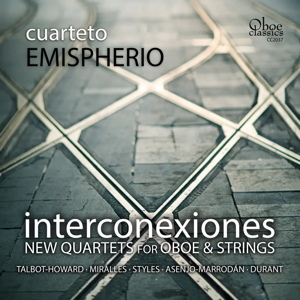
Interconexiones
Althea Talbot-Howard (b.1966)
Seville Cathedral, A Study in Memory – in Arch Form (2022)
Pilar Miralles (b.1997)
Anti-Philosophy of the Subject – Mankind’s Origin is in Its Fellows (2022)
Luke Styles (b.1982)
Capturing Anthems (2022)
Maricarmen Asenjo-Marrodán (b.1978)
Uncertain Paths (2023)
John Richard Durant (b.1960)
Mosaicos (2022)
Cuarteto Emispherio
rec. 2023, Sputnik Recording Studios, Seville, Spain
Oboe Classics CC2037 [64]
Contemporary music for the oboe quartet embraces a wide variety of styles and this release reflects those varieties even so far as to include discreet electronica. The ensemble Cuarteto Emispherio features Sarah Roper (oboe), Vladimir Dmitrienco (violin), Jerome Ireland (viola) and Gretchen Talbot (cello) and plays with stylish commitment throughout in works composed during 2022-23.
Althea Talbot-Howard’s opener is called Seville Cathedral, A Study in Memory – in Arch Form and opens the disc in almost disconcertingly sweetly lyric fashion. The use of handbells in the cello part adds a sonically evocative element to the music which is rather minimalist, perhaps Reich-like in its circling melodic writing. The central panel is slower and string-led, richly veiled, but the oboe leads in the final section. This evocation of the Giralda tower is part of a series of pieces about church buildings and its minimalism conveys the stillness and majesty of such buildings.
The title of Pilar Miralles’ piece is something of a mouthful – Anti-Philosophy of the Subject – Mankind’s Origin is in Its Fellows – and it has something to do with a quotation from a character in Agnès Varda’s documentary film The Gleaners and I. It’s a theatrical piece that doubtless works effectively in performance though on disc these elements – at the end the audience is invited to join hands (count me out, thank you very much) – are inevitably muted. There are cello solos, as well as a rhythmic vitality that is decidedly neo-classical, the music moving with fluid expressive direction interrupted by the oboist reading a poem, Vuelo (Flight), by Spanish poet, Miguel Hernández over sustained string chords. The others join in the recitation as the intensity rises incrementally.
This kind of very public self-expression drawing on the nexus of language, music and physicality is nothing new, of course, but it’s effectively done here. Very different is Australian-born Luke Styles’ Capturing Anthems, a two-part piece that contrasts an angular, bony, busy but clean first section with a slower, more reflective movement full of dialogues and conversations. Strictly musical means prove effective.
The one piece that includes electronics is Maricarmen Asenjo-Marrodán’s Uncertain Paths whose first movement (of two), Reminiscencias: Interconexiones lends its name to the album title. It is a terse work -terse yet clearly defined – and the extended techniques are accompanied by reception bells that the players push with their feet. There is some plink, and also some growling as the music gathers in sonic interest. The second of the movements has a regular heart-beat pulse – nervous tension saturates the music. Here too things are theatrical given that in this second movement a bright red light accentuates the music’s rage in concert performance. Shorn of the light on disc, we get the heartbeat. This is the most challenging of the pieces, a word Philip Larkin used in his jazz reviews when …well, I’ll let you find out yourself.
The last work is the English-born and now Seville-based John Richard Durant’s Mosaicos. These five small fragments offer ripe and surprisingly ripe Iberian evocations, the sinuous oboe swaying or agilely side-stepping. Pan is my favourite, the fourth, for its lucid and effective lyricism but the finale brings a sternly rich flamenco evocation with some Arabic elements too.
The notes are contained on a single fold-out paper. Not glamorous but effective all the same, just as long as you don’t lose it (stick it in the crevice where the CD goes). If you fancy something new for this combination, you should know that this Spanish-centred selection is very finely played and recorded.
Jonathan Woolf
Help us financially by purchasing from


















